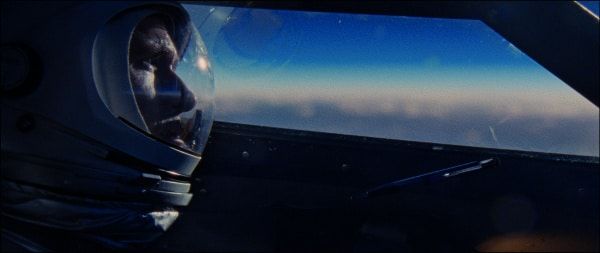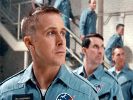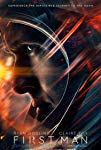Eye For Film >> Movies >> First Man (2018) Film Review
First Man
Reviewed by: Andrew Robertson

First Man is a film of composure, composition, as sure an arrow fired as any by Apollo, archer-god. Yet as with his contributions to the Argive conflict with the Trojans, there is trickery. Concealed within, attended only by an individual, is a paler horse, and, to borrow from another text born of translation, his name that sat on him is Death. This is a story about grief and loneliness here masquerading as one about rockets.
The rivets feel right, even if some details of fuel levels are fictive, the nagging suspicion that a certain set of squares of white and black paint on a certain fuselage are not those of a particular mission but the ones you'd expect from the model kits which are based on the assembly test - these are small concerns though, set and square in a world of slide-rule and cast-metal rocket science. There are computers, but they are electronic echoes of other, hidden, figures, electronic blaring at moments that are tense despite the fact we know it will be successful. Echoes and noises off - the creak and strain and rumble of mechanisms running at the edge of tolerance. Echoes and noises on - the creak and strain and rumble of people running at the edge of tolerance.

For all that this is a portrait of Neil Armstrong and his wife Janet, it is also a film full of moments of reflection, just the capital R Romantic kind but physically, revealingly, stylistically, beautifully. From an early shot of Gosling's eyes, the Spartan-helmet nose-bridge of the X-15 cockpit casting its shadow between them, the line between earth and space, the air and the heavens. A moment earned not just from the re-purposed bomber whose lumbering lofts our apprentice astronaut, the ready tick of the all-knowing altimeter, the metronomic march of Mach numbers, but a fateful bounce, a pebble-skip rocket-ship whose waves are felt far forward. Those Olympic ideals, Cestus, Altus, Fortus - those Olympic names, Mercury (unseen), Gemini, Saturn a Titanic interloper, Cronus the reaper.
Those deaths. The Armstrongs' family tragedy is one of loss and distance and barriers, ones as surely and ably conveyed by physicalities of performance between Claire Foy, Gosling, the various actors who play their children, their friends, their colleagues. There's mention of the war, but it's different knocks at different doors when nobody's coming home. There is more than one moment of thump and smoke and more than one moment of silence, real or imagined, thereafter. There are others in the cast - not only good but at times uncannily similar in appearance - but as with the gap between Earth and space it is the distances and interactions between that compel. None more so than Foy and Gosling.
In the switch from the sterile to the chaotic, envelopes and coffin-corners, Gosling occupies territory similar to Bladerunner 2049, the ragged edge of control as much about what is happening between the eyes as any other circuit-broken. This is one of three 2018 roles for Foy that signal a proper arrival on the big screen, an absolute display of her talent. Talent that, like all those around them, is in service of Damien Chazel's vision.
If this isn't nominated for sound awards or editing (to which Justin Hurwitz and Tom Cross make fine contributions), then directorial composition must surely get one nod or another or there is no justice. There's a meeting at a dinner table that constructs additional meaning purely from staging, no trick but that of the light, twos and ones instead of ones and zeroes, the eye is faster than the hand in moments of proper movie magic. The old 'don't make them like they used to' fits in a film with model-work credits, though in its efforts to depict there are moments of weakness.
The moon-shots are complex, stark, there is a nagging that the shadows are not sharp enough, but that's blurred by time and distance and chemical processes, more hassle than Hasselblad. There are shots of rockets from afar that are presumably archive, others analogous but presumably digitally generated, and however good they are (and they are good) some audiences might get the whiff of Kerbin. That said they are in service of boundaries seen, heard, and unseen, perhaps most literally in the shock-cones on the staging fairings of a rocket roaring sky-ward through the sound barrier.
There are niggles, but ones brought about by the fact that so much other detail feels right, in a film that feels at times both as sure and as experimentally constructed as the craft it depicts. There's a rhythm to it, the bouncing passage of years, a meter and a balance that is sometimes borrowed - Leon Bridges captivates in a few brief lines as Gil Scott-Heron, the still striking stanzas of Whitey On The Moon.
There's another piece quoted - William Safire's IN EVENT OF MOON DISASTER - as fine a piece of literature and part of counterfactual history as any Homeric epic. Mentioned because words on a page still mean something without delivery, but from Josh Singer's script based on James R Hanson there is a sense of individual performance, ensemble strength. As with Whiplash, this is about versions, about people, at times even about play and joy and drive. As with Whiplash this is at once cracking, deep-cutting, free-flowing in a defined range, fast and compelling.
Reviewed on: 24 Oct 2018

















